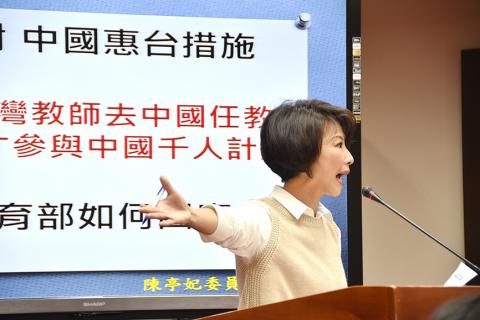China’s 31 incentives to attract Taiwanese businesses and professionals would only have a limited effect on Taiwan, National Development Council (NDC) Minister Chen Mei-ling (陳美伶) said yesterday, adding that the government will introduce better incentives to retain talented people.
The 31 incentives, announced by China’s Taiwan Affairs Office on Feb. 28, include tax cuts, investment capital and relaxed restrictions on certification for 134 professions, which sparked concerns at home over Taiwan losing its competitiveness.
Premier William Lai (賴清德) was originally planning to hold a cross-agency meeting yesterday to discuss the government’s response strategies, but the Executive Yuan on Sunday night canceled the meeting, saying more time is needed to collect information.

Photo: Wu Po-hsuan, Taipei Times
Chen yesterday attended a question-and-answer session at the legislature’s Economics Committee to report on the council’s policies.
The Executive Yuan has convened an ad hoc committee, presided by Vice Premier Shih Jun-ji (施俊吉), to collect response strategies from government agencies, Chen said.
The strategies have not been revealed because they have not been completed yet, she told the media before the session.
Many of the incentives offered by China are old policies and their effects on Taiwan would not be severe, she said.
Lai has proposed plans to remove investment barriers on local businesses, retain talented people and recruit foreign professionals since taking office last year, and many of the plans — although not specifically targeting the Chinese incentives — would be gradually carried out this year, she said.
It is inevitable that talented people would be courted by businesses, Chen said.
As far as Taiwan is concerned, the key is improving its leverage and boosting its self-confidence, she added.
“When we improve Taiwan’s investment environment, talented people would want to stay here and more investments would follow,” Chen said.
Although Chinese firms offer extraordinary salaries to attract talent from around the world, Taiwan can retain domestic professionals by raising their salaries, and introducing better incentives and work opportunities, she said.
In another legislative session yesterday, Minister of Health and Welfare Chen Shih-chung (陳時中) said that about 200 medical professionals are working in China, which has been long offering high salaries to attract them.
Talented people are competing in a global environment, while how to improve the salaries and working conditions of healthcare workers and show them due respect are key issues for the ministry, Chen Shih-chung said.

CHANGING LANDSCAPE: Many of the part-time programs for educators were no longer needed, as many teachers obtain a graduate degree before joining the workforce, experts said Taiwanese universities this year canceled 86 programs, Ministry of Education data showed, with educators attributing the closures to the nation’s low birthrate as well as shifting trends. Fifty-three of the shuttered programs were part-time postgraduate degree programs, about 62 percent of the total, the most in the past five years, the data showed. National Taiwan Normal University (NTNU) discontinued the most part-time master’s programs, at 16: chemistry, life science, earth science, physics, fine arts, music, special education, health promotion and health education, educational psychology and counseling, education, design, Chinese as a second language, library and information sciences, mechatronics engineering, history, physical education

DEADLOCK: As the commission is unable to forum a quorum to review license renewal applications, the channel operators are not at fault and can air past their license date The National Communications Commission (NCC) yesterday said that the Public Television Service (PTS) and 36 other television and radio broadcasters could continue airing, despite the commission’s inability to meet a quorum to review their license renewal applications. The licenses of PTS and the other channels are set to expire between this month and June. The National Communications Commission Organization Act (國家通訊傳播委員會組織法) stipulates that the commission must meet the mandated quorum of four to hold a valid meeting. The seven-member commission currently has only three commissioners. “We have informed the channel operators of the progress we have made in reviewing their license renewal applications, and

The High Prosecutors’ Office yesterday withdrew an appeal against the acquittal of a former bank manager 22 years after his death, marking Taiwan’s first instance of prosecutors rendering posthumous justice to a wrongfully convicted defendant. Chu Ching-en (諸慶恩) — formerly a manager at the Taipei branch of BNP Paribas — was in 1999 accused by Weng Mao-chung (翁茂鍾), then-president of Chia Her Industrial Co, of forging a request for a fixed deposit of US$10 million by I-Hwa Industrial Co, a subsidiary of Chia Her, which was used as collateral. Chu was ruled not guilty in the first trial, but was found guilty

Taiwan People’s Party (TPP) Chairman Huang Kuo-chang (黃國昌) yesterday appealed to the authorities to release former Taipei mayor Ko Wen-je (柯文哲) from pretrial detention amid conflicting reports about his health. The TPP at a news conference on Thursday said that Ko should be released to a hospital for treatment, adding that he has blood in his urine and had spells of pain and nausea followed by vomiting over the past three months. Hsieh Yen-yau (謝炎堯), a retired professor of internal medicine and Ko’s former teacher, said that Ko’s symptoms aligned with gallstones, kidney inflammation and potentially dangerous heart conditions. Ko, charged with